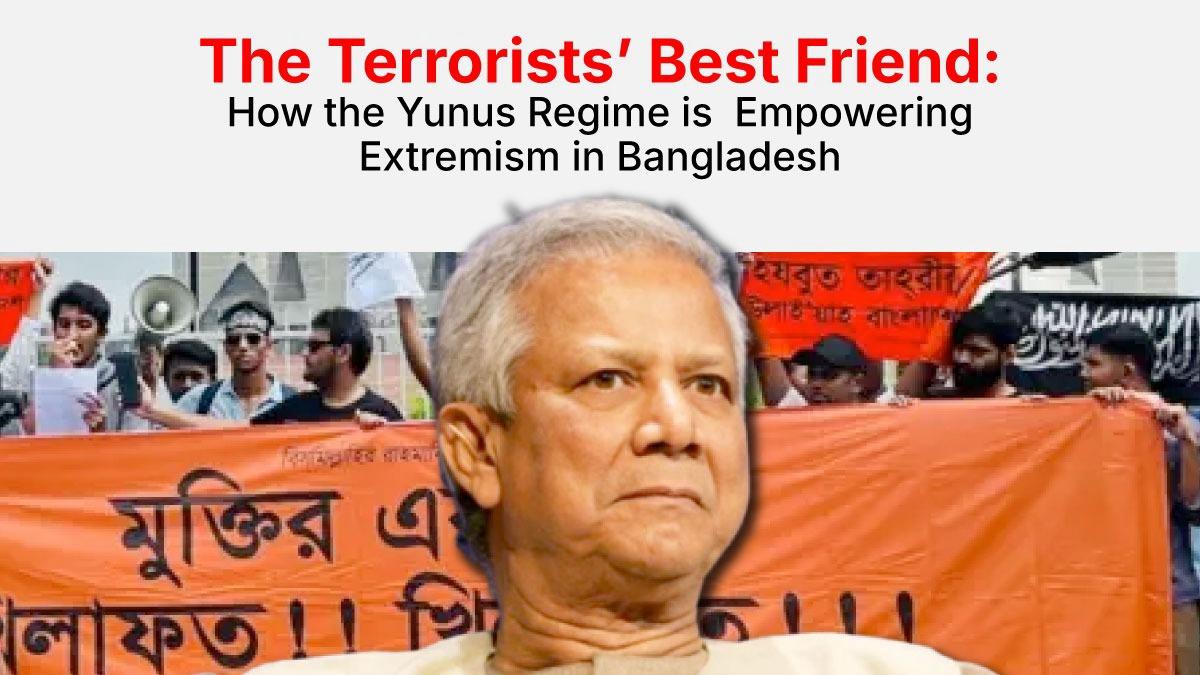Once hailed as a global icon of peace and microfinance, Muhammad Yunus now stands accused of something far more sinister—enabling the resurgence of violent extremism in Bangladesh. Under his unelected, unconstitutional interim regime, banned militant organizations like Hizb ut-Tahrir have returned to the streets with impunity, emboldened and protected. While pro-democracy voices are silenced and opposition leaders are jailed without trial, known radicals are being released from prison and allowed to regroup. This is not neutrality. This is complicity. Yunus’s government is not just failing to stop terrorism—it is actively helping it thrive.
Interim Government Paving the Way for Islamic Radicalism
The Rise of Freed Extremists Post–August 5
Since August 5, the so-called “caretaker” government under Muhammad Yunus has presided over a systematic and alarming release of convicted extremists—a move that reeks of complicity, not coincidence.
In a country that once vowed “zero tolerance” against terrorism, the Yunus regime has instead adopted a zero accountability policy for the most dangerous individuals in our prisons. Convicted militants, radical ideologues, and known jihadists are being freed, not as part of any transparent legal process, but through opaque decisions that deliberately undermine public security.
Yunus Government Releases 174 Militants in Just Four Months
Let us be clear: this is not justice—it is jihadist appeasement.
One of the most shocking examples is the commutation of death sentences for militants involved in the 2016 Holey Artisan Bakery attack, the deadliest terror assault in modern Bangladeshi history. These were ISIS-inspired attackers who slaughtered 22 innocent lives, including foreigners and Bangladeshis alike. Instead of standing firm on justice, the Yunus regime has reduced their punishment to life imprisonment, sending a chilling message: terrorists will be spared if the regime sees political gain.
And the madness doesn’t stop there.
Reports have confirmed the mass release of dozens of suspected extremists from various prisons across the country in the weeks following the government’s takeover. In most cases, no official explanation was given. These are not petty criminals—they are individuals with direct links to banned outfits such as Ansar al-Islam, JMB, and Hizb ut-Tahrir.
Bail Granted to Individuals Accused of Militancy
This is not a series of isolated mistakes. This is a deliberate strategy to rehabilitate and empower forces of violent extremism under the cloak of governance.
The Yunus regime is not neutral. It is not transitional. It is not democratic.
It is a jihadist-friendly machine dismantling national security from within.
The Resurrection of Hizb ut-Tahrir: A Dangerous Precedent
Under the previous Awami League government, Hizb ut-Tahrir was officially banned in 2009 due to its serious threat to public safety and national security. For over a decade, this extremist organization operated mostly in the shadows, disorganized, contained, and severely weakened by relentless law enforcement and strict legal action.
But everything changed almost overnight under Yunus’s interim government.
Barely a week after the fall of the previous regime, on August 9, 2024, Hizb ut-Tahrir militants brazenly held open rallies in Dhaka, including a major gathering at the Baitul Mukarram North Gate and a press conference at the Dhaka Press Club demanding the withdrawal of their ban and claiming to fight for “true justice and welfare” of Bangladeshis. This was no hidden protest—it was a public demonstration of power, signaling the group’s reckless return to the political mainstream.
Rising influence of Hizb ut Tahrir in Bangladesh
This brazen reemergence is not a coincidence. It is a direct result of the Yunus government’s deliberate negligence—the refusal to enforce the ban and the tacit acceptance of extremist mobilization on the streets. By allowing Hizb ut-Tahrir to flaunt their agenda openly and without fear of arrest, Yunus’s administration has sent a dangerous signal: banned terrorists are no longer enemies of the state but tolerated political actors.
Hizb ut-Tahrir Reemerges with March Near Baitul Mukarram
Meanwhile, the government has been conspicuously silent and evasive. When asked about Hizb ut-Tahrir’s activities and their formal demand for ban revocation at the press club on September 9, the Home Ministry and law enforcement spokespeople have avoided any direct answers. Yunus’s home affairs advisers have refused interviews, sidestepped questions in official briefings, and effectively left the door open for Hizb ut-Tahrir’s resurgence.
This erosion of legal boundaries is not a minor lapse but a catastrophic failure that undermines the rule of law in Bangladesh. It emboldens other extremist groups to reemerge and challenges the very fabric of the country’s fragile peace and security.
Under the Yunus government, the line between terrorists and legitimate political actors has dangerously blurred, and the consequences could be disastrous for Bangladesh’s future.
Mahfuz Alam: A Jihadist in the Inner Circle
If there was any lingering doubt about the Yunus government’s ties to extremist networks, the appointment of Mahfuz Alam as an advisor should shatter it completely.
‘Hizb Ut-Tahrir Militant’ Mahfuz Now Advisor to Yunus
Mahfuz Alam isn’t just controversial—he’s dangerous. This man has a well-documented history of extremist affiliations, notably with Hizb ut-Tahrir, the same organization that was banned for plotting to overthrow the democratic government and replace it with a caliphate. Under the Awami League government, Mahfuz was blacklisted by intelligence agencies for inciting radical ideology in universities and recruiting students for jihadist causes.
Yet today, under Yunus’s so-called “neutral” interim government, Mahfuz Alam is no longer hiding in the shadows. He is sitting at the heart of power, whispering into the ears of those making national decisions. He has been given legitimacy, status, and influence—not in spite of his past, but seemingly because of it.
This is not a clerical error. This is a calculated move.
The message is clear: radicals are welcome in Yunus’s Bangladesh, especially if they can help consolidate his rule and destabilize secular forces. This appointment is not just a slap in the face to the victims of terrorism—it is a betrayal of the nation’s struggle against extremism.
Worse still, there has been no explanation, no accountability, and no condemnation from within the administration. Not a single minister, bureaucrat, or institutional figure has stood up to question why a man with extremist credentials is now shaping national policy. This is not governance—it is collaboration with extremism.
Under Muhammad Yunus’s watch, jihadists are not being hunted down—they are being hired. And with Mahfuz Alam’s ascent to power, the danger is no longer on the streets. It is inside the government itself.
Why It Matters: A Nation’s Security, Sovereignty, and Self-Respect at Stake
What’s happening under the Yunus-led interim regime is not just political mismanagement—it is a national security crisis in the making.
The resurgence of banned jihadist groups, the appointment of extremists to advisory positions, and the reduction of death sentences for convicted terrorists are not isolated incidents. They are part of a disturbing pattern of state-sponsored normalization of radicalism.
First, this threatens the security of every Bangladeshi citizen. Groups like Hizb ut-Tahrir are not political dissidents—they are ideological terrorists with a global agenda. Their return to public life, unchecked and unpunished, sends a chilling message: terror has impunity under this regime. The very organizations that once plotted to overthrow the state are now holding press conferences and walking freely through the capital.
Second, it jeopardizes our sovereignty. A government that cannot distinguish between enemies of the state and political actors has no control over its national integrity. By allowing extremist ideology to infiltrate institutions and policymaking, Yunus is weakening Bangladesh from within. This is not just incompetence—it is wilful complicity in undermining the democratic foundations of our country.
Third, and perhaps most devastatingly, it brings shame to the families of those murdered in terror attacks, to the officers who gave their lives fighting extremism, and to the image of Bangladesh in the eyes of the world. When the killers of Holey Artisan victims have their sentences reduced, when jihadists hold rallies under police protection, when banned terror groups demand legitimacy from the press club, it dishonors every sacrifice made in the fight against militancy.
This is not neutrality. This is not reform. This is surrender.
The Yunus government has not simply failed to resist terrorism—it has opened the door, rolled out the red carpet, and invited it back into the halls of power.
If this continues, Bangladesh is at risk of becoming a safe haven for extremists once again, undoing decades of counterterrorism gains. And history will remember that it happened not under foreign occupation, but under the rule of a so-called Nobel laureate.





